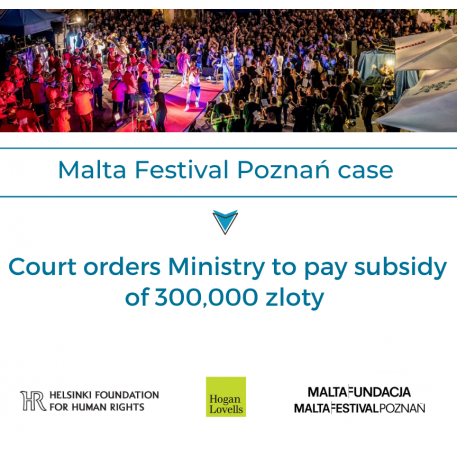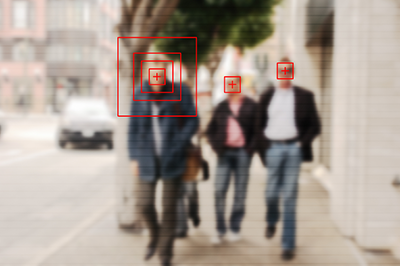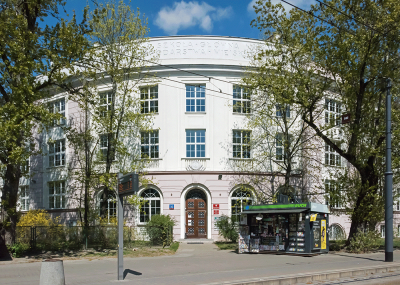
The case of the Ministry’s unpaid subsidy to the Malta Festival has been pending since 2017 when Oliver Frljić was one of the Festival’s curators. The Malta Foundation filed the lawsuit in 2018 represented by attorneys of Hogan Lovells, who agreed to take on the case pro bono following a request from the Helsinki Foundation for Human Rights. In 2019, the Malta Foundation won in the Regional Court of Warsaw, but the Ministry appealed against the first-instance judgment. On 8 July 2020, the Warsaw Court of Appeal made an in camera order to dismiss the appeal. In effect, the Ministry obligation to pay PLN 300,000 to the Malta Foundation has been upheld.
In 2016, the Malta Foundation and the Ministry of Culture and National Heritage entered into a three-year contract for the organisation of the Malta Festival Poznań, which obliged the Ministry to pay annual dedicated subsidies. However, in 2017, the Ministry did not pay a subsidy of PLN 300,000 because Olivier Frljić, a stage director and the author of controversial play Klątwa (The Curse), became one of the Festival’s Curators. The production of The Curse was opposed by certain conservative groups and the play was said to insult religious feelings.
On 5 June 2018, the Malta Foundation filed a lawsuit against the Ministry of Culture and National Heritage, seeking the payment of PLN 300,000 on account of the Ministry’s failure to pay this amount as a dedicated subsidy for the 2017 Festival.
In April 2019, the Regional Court in Warsaw has awarded the Malta Foundation the amount of PLN 300,000 plus interest to be paid from the State Treasury represented by the Minister of Culture and National Heritage on account of the unpaid dedicated subsidy originally granted in 2017 for the organisation of that year’s Malta Festival Poznań. The court justified this decision by noting the purely contractual nature of the Ministry’s obligation. The court also found that the provisions of the 2016 agreement for the payment of subsidies earmarked for the organisation of the Malta Festival Poznań in 2016-2018 were clear and unambiguous. The court noted that the agreement entitled the Ministry to reduce the fee only in strictly defined situations, but emphasised that none of these situations had occurred in the case at hand. The court also pointed out that the Ministry had known that Oliver Frljić would be the Festival’s Curator as early as in 2015, so his appointment should not have led to the refusal of the subsidy for the Malta Foundation.
The April judgment was challenged by the Ministry of Culture and National Heritage but its appeal failed and was dismissed by an in camera order issued by the Warsaw Court of Appeal on 8 July 2020.
The matter at hand is a landmark case as it is the first case in Poland that involves a denial of domestic subsidies due to the personal involvement of a particular artist. Notably, the Constitution of the Republic of Poland guarantees that everyone can enjoy the freedom of artistic expression and may freely use cultural goods. In Poland, culture is financed mainly from the national budget so a decision denying a subsidy can be considered a measure of “soft censorship”. Soft censorship consists of pressurising artists to refrain from certain activities such as the production of a play. Although the court based its ruling solely on a breach of contractual obligations, it should be pointed out that culture should be financed regardless of what play is to be produced or which artist is to perform or endorse a cultural institution.
We are delighted to see that the Malta Festival’s appeal succeeded. Law and justice are all we ever wanted… and we got it. For three years we have fought against the censorship of Professor Piotr Gliński, whose ‘the only right’ ideology has led to unnecessary litigation costs, interest, a two-year’s involvement of the courts and the people working on this case. Once again, we would like to thank the Helsinki Foundation for Human Rights, Dr Piotr Kładoczny, Dr Katarzyna Wiśniewska, and Mr Adam Klepczyński for their immense support. Our gratitude also goes to our pro bono counsel, Dr Wojciech Marchwicki and Mr Przemysław Tacij from Hogan Lovells. I also thank the audience and the artists for their gesture of solidarity with Malta. In 2017, Mariusz Wilczyński launched a grassroots project in the world of art, the Auction for the Malta Festival. The other moving gesture was the successful crowdfunding campaign “Become the Minister of Culture”, comments Michał Merczyński, director of Malta Festival Poznań.
Dr Wojciech Marchwicki, a Hogan Lovells advocate representing the Malta Foundation in the court proceedings, emphasized:
– The public financing of culture is governed by certain rules, and agreements must be kept. The Ministry of Culture and Minister Gliński do not spend their own money; they only manage public funds. The way in which public monies are distributed should be determined by the criteria which are as objective as possible. The rulings of the courts confirm that the government must not act “without a procedure”. A cultural institution should never be punished for working with an artist who is inconvenient to those in power. A judgment of an independent court proved necessary to remind the Minister of Culture of this obviousness.
– The action brought by the Malta Foundation against the Ministry of Culture has led to a landmark case. The judgment entered in this case has a significant impact on the development and operation of culture. It shows that the freedom of artistic creation is a constitutional value that may not be restricted by unilateral decisions based solely on the fact that the government perceives a given artist to be controversial”, says HFHR’s lawyer Adam Klepczyński. He adds: – Let’s not forget that culture in Poland is often financed from the public purse, which means that such financing should be provided transparently, without any limitations infringing upon the freedom of artistic expression.
The case is conducted by HFHR’s Strategic Litigation Programme. The Malta Foundation is represented by Hogan Lovells attorneys Wojciech Marchwicki and Przemysław Tacij who agreed to take on the case pro bono at the request of the HFHR.


